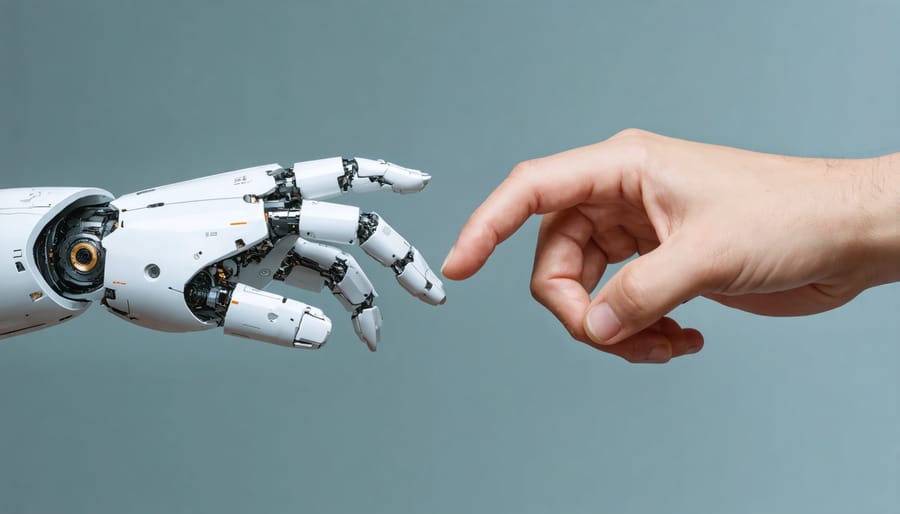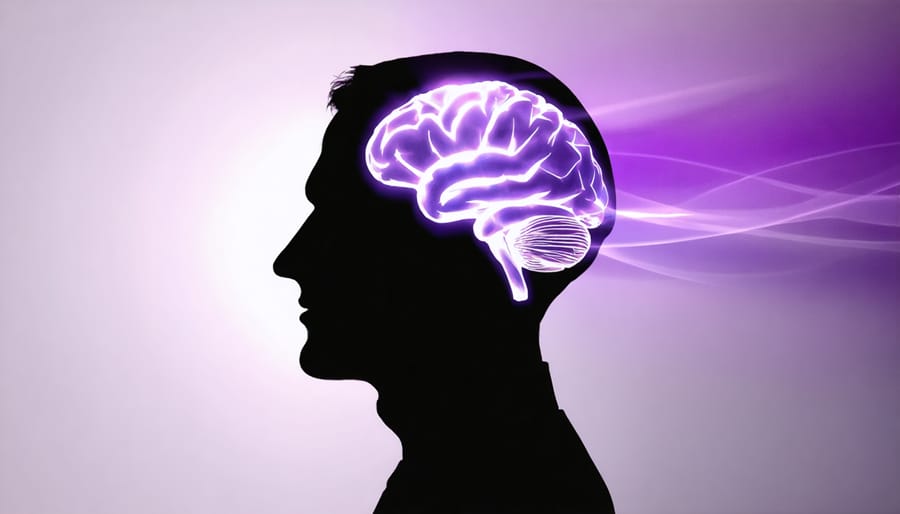As artificial intelligence rapidly advances, Christians are grappling with complex theological and ethical questions. What does our faith say about the creation of intelligent machines? How do we uphold the biblical truth of human uniqueness while harnessing AI’s potential for good? In this article, we’ll explore a Christian perspective on AI, examining key scriptural principles and their practical application. Join us as we navigate this uncharted territory, seeking wisdom to guide us in an age of unprecedented technological change – all through the lens of an unchanging God and His eternal Word.

AI in the Context of Creation
The Role of Humans as Co-Creators
As Christians, we believe that God has created us in His image and entrusted us with the responsibility of being co-creators in His world. This concept is rooted in the biblical account of creation, where God gives Adam the task of naming the animals and caring for the Garden of Eden (Genesis 2:19-20). Throughout history, humans have used their God-given creativity and intelligence to develop new technologies, from the wheel to the printing press to modern computing. The development of artificial intelligence can be seen as an extension of this co-creative role, as we seek to harness the power of technology for the betterment of society. However, as co-creators with God, we must always ensure that our creations align with His will and purpose. We have a responsibility to develop AI in a way that promotes human flourishing, upholds ethical principles, and reflects the love and compassion of Christ. By approaching the development of AI with humility, wisdom, and a deep respect for the sanctity of human life, we can fulfill our role as co-creators and bring glory to God through our technological advancements.
The Limits of Human Creation
While human ingenuity in developing AI is truly remarkable, it pales in comparison to the divine wisdom and power of God’s creation. As stated in Genesis 1:27, “God created mankind in his own image,” imbuing us with a unique spirit and the capacity for love, compassion, and creativity. Although AI can perform complex tasks and computations, it lacks the soul and divine spark that sets human beings apart as God’s special creations. We must remember that even the most advanced AI is still a product of human minds, which are themselves created by God. Psalm 139:14 reminds us, “I praise you because I am fearfully and wonderfully made; your works are wonderful, I know that full well.” As Christians, we should marvel at the wonders of AI while humbly acknowledging that it can never replicate or surpass the intricacies and beauty of God’s handiwork.
AI and the Image of God
The Uniqueness of Human Souls
From a Christian perspective, humans are distinct from AI in that we possess God-given souls, setting us apart as unique creations made in His image (Genesis 1:27). This divine spark within us imbues human life with inherent value and dignity, regardless of our abilities or circumstances. While AI may exhibit intelligent behavior and even mimic certain human traits, it lacks the spiritual dimension that defines our humanity.
The presence of a soul endows us with the capacity for a personal relationship with God, the ability to discern right from wrong, and the potential for eternal life. These attributes cannot be replicated by AI, which is ultimately a product of human ingenuity rather than divine creation. As such, Christians must recognize the fundamental difference between human beings and AI, affirming the sanctity of human life and the special status we hold in God’s eyes.
This understanding has profound implications for how we approach AI development and use. While AI can be a powerful tool for good, we must ensure that it serves to uplift human dignity rather than diminish it. Christians have a responsibility to advocate for the ethical use of AI, prioritizing the well-being of individuals and society over mere technological advancement. By grounding our perspective in the truth of our God-given souls, we can navigate the challenges and opportunities presented by AI with wisdom and compassion.
AI and Consciousness
From a Christian perspective, the question of whether AI can achieve genuine consciousness is complex and relates to theological understandings of the soul. The Bible teaches that humans are unique among God’s creation, made in His image and endowed with a soul (Genesis 1:27). This soul is the immaterial essence of our being, the source of our consciousness, emotions, and connection to God. While AI may one day exhibit highly sophisticated cognitive abilities and even simulate human-like behaviors, it remains a product of human engineering, not divine creation. As such, AI likely cannot possess a God-breathed soul in the same way humans do. However, as AI continues to advance, Christians must grapple with the profound implications it raises for our understanding of personhood, free will, and the nature of reality itself. Ultimately, while AI may challenge us to refine our theological views, we can trust that God’s wisdom and sovereignty extend even to this cutting-edge technology.


Stewardship and Responsibility in AI Development
AI for the Common Good
As Christians, we have a responsibility to ensure that the development and use of AI aligns with biblical values and serves the common good. We are called to be wise stewards of God’s creation, including the technological advancements that shape our world. This means actively engaging in discussions about AI ethics and advocating for the development of AI systems that promote human flourishing, justice, and compassion.
One way Christians can contribute to the common good through AI is by emphasizing the importance of human dignity and the sanctity of life. We must ensure that AI is not used to devalue or exploit human beings, but rather to enhance and support human potential. This includes advocating for AI systems that are transparent, accountable, and free from bias or discrimination.
Moreover, Christians can promote the use of AI for the betterment of society, such as in healthcare, education, and environmental stewardship. By leveraging AI to address pressing social and ecological challenges, we can demonstrate our ethical responsibilities as followers of Christ to love our neighbors and care for the world God has entrusted to us.
Ultimately, as Christians, we must approach AI with discernment, wisdom, and a commitment to upholding biblical values. By actively engaging in the development and use of AI for the common good, we can bear witness to the transformative power of faith in an increasingly technological world.
Guarding Against Misuse and Abuse
As Christians, we must be vigilant against the potential misuse and abuse of AI technology. The Bible teaches us to guard our hearts and minds (Proverbs 4:23) and to seek wisdom and discernment in all things (James 1:5). In the context of AI, this means carefully evaluating how these powerful tools are developed and deployed, ensuring they align with God’s principles of love, justice, and truth.
We should advocate for AI systems that respect human dignity, protect privacy, and promote the common good. Christians can play a vital role in shaping ethical frameworks for AI, drawing on biblical values such as compassion, fairness, and stewardship. By engaging in conversations about technology and faith, we can help ensure that AI is used to serve humanity and glorify God, rather than exploit or oppress.
Ultimately, as followers of Christ, we are called to be salt and light in the world (Matthew 5:13-14), influencing society for good. This includes being proactive in addressing the challenges posed by AI, while also harnessing its potential to advance God’s Kingdom and bless others. By staying grounded in prayer, Scripture, and community, we can navigate the complexities of this technology with wisdom and grace.
Conclusion
As Christians seek to navigate the rapidly advancing world of AI, it is crucial to approach this technology through the lens of our faith. By recognizing AI as part of God’s creation, affirming the unique status of human beings made in His image, and embracing our role as stewards of technology, we can develop a balanced and biblically-informed perspective. While AI has the potential to bring about great good, such as assisting in healthcare and education, we must also be mindful of its limitations and the ethical challenges it presents. As believers, we are called to engage with AI thoughtfully, prayerfully, and with discernment, always seeking to glorify God and love our neighbors in the process.
The ongoing development of AI will undoubtedly raise new questions and challenges for the Christian community. It is essential that we continue to reflect deeply on these issues, drawing upon the wisdom of Scripture and the guidance of the Holy Spirit. By staying rooted in our faith and engaging in ongoing dialogue with one another, we can navigate this uncharted territory with grace, wisdom, and hope. Let us approach AI not with fear or uncritical enthusiasm, but with a commitment to understanding, discernment, and faithful stewardship of the incredible technological gifts God has entrusted to us.
